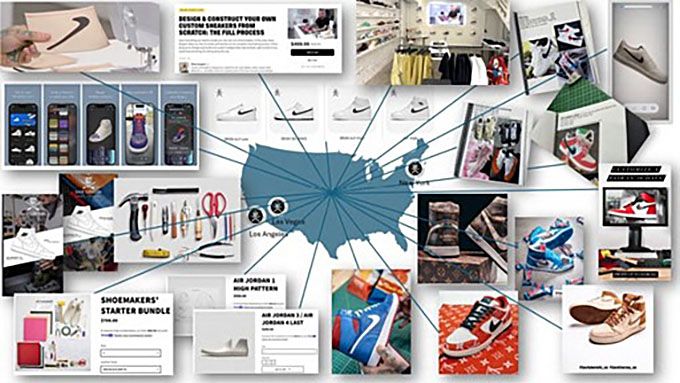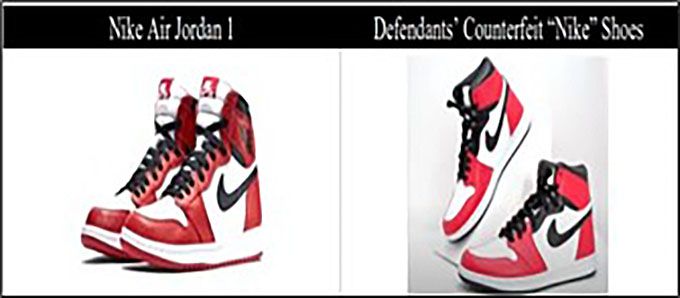Nike and Sneaker Customizer Lace Up a Settlement
On June 18, 2025, Nike, Inc. (“Nike”) and Dominic Ciambrone (“Ciambrone”), founder of the shoe customization outfit, The Shoe Surgeon, entered into a confidential settlement and agreed to an accompanying in New York district court, signaling the end of a trademark dispute over The Shoe Surgeon’s alleged sale of unauthorized Nike-branded shoes and DIY kits to create custom lookalikes that had the sneaker and IP communities watching every step. [See below, an image from the complaint that presents one snapshot of the breadth of The Shoe Surgeon’s activities].

The consent judgment, which reflects a negotiated settlement between the parties, essentially limits Ciambrone, his partners and his company S2, Inc. (collectively, the “Defendants”) from certain unauthorized sneaker customization activities involving the commercial use of Nike’s trademarks and branding that might cause consumer confusion, with a carveout that allows Defendants to create custom, non-commercial pieces involving Nike shoes or branding in special situations. The settlement also requires Defendants to pay an undisclosed sum to Nike. (, No. 24-05307 (S.D.N.Y. Consent Judgment June 23, 2025)).
Ciambrone is a Los Angeles-based designer and entrepreneur who rose to prominence through his artistry and intricate, high-end customizations of popular sneaker silhouettes. Ciambrone’s individual journey kicked off in the early 2000s when he started experimenting with sneaker customization in high school as a form of self-expression. He founded “The Shoe Surgeon” alongside his business partner, Imbimbo, in late 2017, a brand that stitches together craftsmanship, luxury materials, and streetwear aesthetics to create bespoke sneakers that often retail for thousands of dollars. His studio in South L.A. became a hub for sneaker artistry, attracting celebrity clients, collectors, and even corporate collaborators, all of whom wanted to get a foot in the door.
Nike and Ciambrone initially shared a collaborative relationship. For example, in 2023 Nike commissioned him to create custom sneakers for high-profile moments. However, the relationship between Nike and Ciambrone began to fray as Ciambrone’s business grew. Nike took issue when it alleged the Shoe Surgeon expanded from being a “bespoke, one-of-one shoe customizer” for specific clients or artistic display to “build a business around Nike’s brand and shoes, selling “Nike” products that were significantly altered Nike shoes (what Nike termed “Infringing New Shoes”) or else shoes created from scratch bearing the “Swoosh” that Nike claimed looked like artistically recreated Nike-branded shoes. [See image from the complaint below]. According to Nike, this was an attempt “to build an entire multifaceted retail empire through their unauthorized use of Nike’s trademark rights….”

Moreover, Nike claimed that the Defendants were implying Nike’s endorsement or sponsorship and using Nike’s intellectual property and trademarks to enter into collaborations and digital rights agreements involving
customized Nike shoes for well-known brands, all without Nike’s permission. The complaint also alleged that Defendants were selling shoe-making kits and running an “academy” that allegedly teaches customers how to make customized replicas of Nike sneakers. Thus, the core of Nike’s argument was that the Defendants’ business model of deconstructing authentic Nike sneakers and rebuilding them into high-end, bespoke designs amounted to unauthorized commercial use of Nike’s protected intellectual property.
Nike alleged that it had meetings with Defendants to resolve the IP-related issues and discuss potential future projects, but that such actions only resulted in takedowns of certain products and what it called “perceived compliance.” After discussions broke down, Nike filed a in July 2024 against Defendants, alleging trademark infringement, false designation of origin, and dilution under the Lanham Act, as well as counterfeiting and unfair competition under New York law. Nike sought monetary damages and a permanent injunction barring Defendants from selling infringing Nike shoes and DIY kits to make infringing “Nike” shoes, from entering into shoe customization agreements with third party brands using Nike IP, and marketing customization classes featuring replicas of Nike shoes.
The Defendants responded to the complaint with a 100-page filed in November 2024, asserting numerous affirmative defenses (such as fair use and the first sale doctrine) and claiming that Nike was liable for defamation and/or trade libel for the statements it had issued about the Defendants and for unjust enrichment from allegedly gaining knowledge about shoe customization from Ciambrone and acquiring his “lifetime of customization know-how” in order to re-brand its customization businesses. Defendants also sought a declaratory judgment that Nike’s trade dress registrations should be declared functional and unenforceable. Most relevantly, the Defendants challenged Nike’s basic theory of infringement, stating that The Shoe Surgeon had not shifted its business model from authentic and creative customizations and denying that “they — or any person — require[s] Nike’s permission to customize authentic Nike shoes into art.” In its Answer, Defendants characterized certain online sales where they purchase an original Nike shoe to use as a base for a customized shoe for the customer as non-infringing and denied that they produce any “Nike-branded shoes entirely from scratch.” Defendants admitted that Ciambrone did not seek Nike’s permission to start customizing Nike shoes, but claim that thereafter, “Nike repeatedly came to him to exploit his expertise and collaborate with The Shoe Surgeon on customization classes…[and] implying that Nike approved The Shoe Surgeon continuing to customize Nike shoes and offer customization classes using Nike shoes.”
Preferring to put this case back in the box, the parties eventually reached a confidential settlement in June 2025. Under the terms of the entered by the court, the Defendants conceded liability on most of Nike’s legal claims and acknowledged the validity of Nike’s various marks. Defendants also agreed, among other things, to be permanently benched from manufacturing, promoting, advertising, distributing, or selling any products or digital assets that use Nike’s trademarks, trade dress, or other protected elements in a way that is likely to cause consumer confusion or cause a mistaken belief that such products are sponsored by Nike. The consent judgment also bars Defendants from offering deconstruction or reconstruction workshops featuring Nike’s marks or manufacturing or selling shoe-making products used to make shoes that feature Nike’s marks or a “colorable imitation.” Moving forward, The Shoe Surgeon is permitted to provide certain “one of one” customization services as long as such services include a written disclosure that the services are (a) not authorized by Nike, (b) may impact the performance of the genuine shoes, and (c) are provided for personal and non-commercial purposes. The judgment also requires the Defendants to remove online listings containing “counterfeit or infringing products” and “unauthorized prior collaborations” featuring Nike’s marks from their website within thirty days. While the monetary terms of the settlement remain confidential, the scope of the injunctive relief suggests that Nike viewed this case as a full-court press aimed at setting a precedent for how it will handle similar disputes going forward.
The Southern District of New York has become a frequent venue for Nike’s IP enforcement efforts, with Nike being increasingly willing to litigate against what it sees as unauthorized commercial exploitation of its designs. The case highlights the interesting IP issues when artistic creativity meets commercialization, as well as the fine line between customization and infringement. While the sneaker world thrives on innovation and reinterpretation, the legal landscape and existing IP laws present boundaries that are still being written (and designed).
